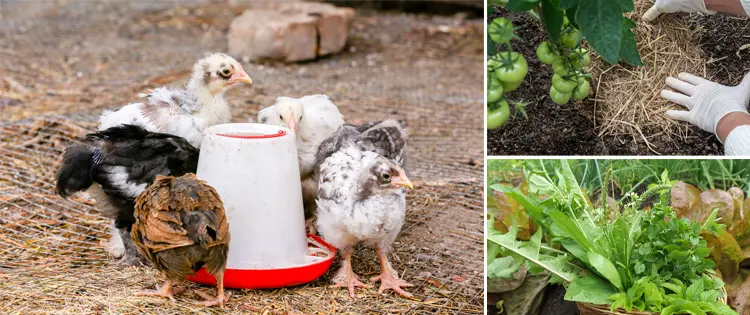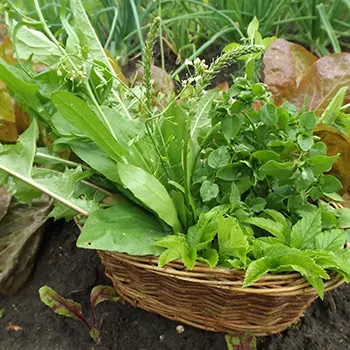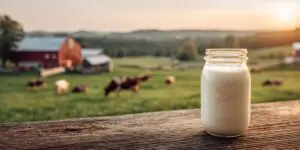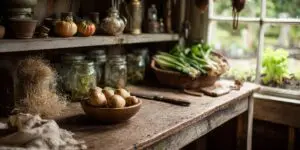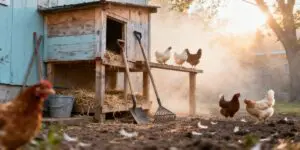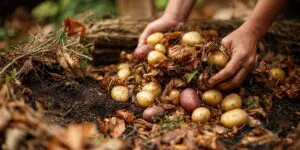As a homesteader, there is plenty to do during May including companion planting, housing young chicks outside, mulching the garden, and much more. It is also important to mention that your homesteading needs will vary depending on your part of the country, the weather, and your homesteading needs in general. Keep reading for some in-depth information about things to do around your homestead during the month of May.
Companion Planting
May is a great time to start companion planting to get the most out of your garden by reducing the number of pests and adding additional nutrients to the soil. Here are some companion plants you might want to consider in the month of May:
- Basil: Basil and tomatoes make a great combination, not just in food, but also in the garden. Grow some basil next to your tomatoes and it will help repel mosquitoes and flies so that your plants yield more tomatoes.
- Green Beans: Grow some green beans next to your corn. You won’t need to build a trellis for the corn because the beans grow up in the cornstalks. Green beans also help convert nitrogen into a useable form.
- Onions: Plant some onions near carrots and they will repel aphids and carrot fly.
- Radishes: Plant radishes with cucumbers to chase away cucumber beetles.
House Young Chicks Outside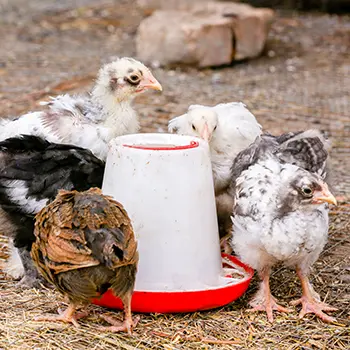
May is the perfect time to house young chicks outside so they can stretch their wings and get to experience real chicken life. Once the lowest outside temperature is the same as the target brooder temperature, it’s safe to move your chicks into the outside henhouse. A temperature chart like this will give you all the information you need to determine if the weather is suitable enough. For example, the chart states that a chick of three weeks old should be kept at a temperature between 75-80 degrees F. If the temperature during the day is 80 degrees F, but the nighttime temperature is 65 degrees F, it’s safe for them to stay outside during the day, but not at night. However, chicks can move out at six to ten weeks old and should be fully feathered.
Mulch The Garden
Mulching is a time-consuming and tedious process, but once it’s done, it will save you plenty of time in the long run when it comes to looking after your garden. To improve the efficiency of your garden, it’s essential that you choose an organic mulch. Inorganic mulch will keep weeds from growing, but it won’t nourish the soil. And as I’m sure you’re aware, without healthy soil, you can’t expect healthy crops. During the decomposing process, organic mulch feeds the plants because it contains nutrients such as phosphorous and potassium. Additionally, organic mulch helps improve the structure of the soil, making it more fertile, free-draining, and moisture retentive. And finally, organic mulch is good for the environment because it is a recycled natural material.
Forage For Herbal Remedies and Food
During the early spring months, there are plenty of plants to gather for food and herbal remedies. Here is an idea of what you can expect to find in your garden in the month of May:
- Dandelion: You can eat young dandelion leaves in the same way you would any other leafy green vegetable. The yellow flower has a honey flavor making them the perfect addition to cakes and cookies. You can also make dandelion jelly. Infuse dandelion in oil to soothe arthritis pain and raw and chapped skin.
- Plantain Leaves: Young tender plantain leaves are similar to spinach, they can be eaten in a stew, a salad, or you can add them to smoothies. But make sure you use the young leaves for food as the older leaves are bitter. Plantain leaves are great for soothing bug bites, bee stings, burns, and itchy skin. Make a salve and apply it directly to the skin. You can also use plantain leaves for sunburn by freezing them in aloe.
- Chickweed: One of the first greens to sprout in spring is chickweed. They make delicious pesto; they are bland, so add them to a smoothie or a mixed green salad for some additional flavor. Chickweed works wonders on itchy skin, grind the leaves down in some vinegar, and apply it directly to the skin, or add it to some bathwater to gain relief from skin-related ailments. You can also infuse chickweed in oil for irritated skin, or drink it as a tea to get rid of a cough.
- Violet: You can sprinkle chopped violet leaves over salads, soups, and cakes. You can also turn violet into tea by pouring hot water over the petals in a teacup. Violet root is a powerful remedy for sore throats, bronchitis, colds, and coughs. The leaves act as an antiseptic and can be used externally as a compress to prevent open wounds from becoming infected.
Related: The Berry That Is Illegal To Grow (In Some States) But Perfectly Fine To Forage (Video)
Harvesting and Food Preservation
May is harvesting month for a lot of crops including broad beans, strawberries, asparagus, globe artichokes, rhubarb, and much more. Depending on the size of your garden, after harvesting, there are bound to be plenty of leftovers. Use your food preservation skills to ensure you’ve got plenty of fruits and vegetables to see you through the winter months.
Clean the Goat Pen
Keeping the goat pen clean during warmer months is extremely important because goats can develop parasites or worms in warm weather. Also, as much as we love our goats, they are not the cleanest animals and it can be a challenge to keep the pen clean. The most effective method for cleaning a goat pen is to change the bedding when required and disinfect the floor with lime powder, lime wash, or baking soda and vinegar. You will also need to make sure the pen is kept dry.
Final Thought
As you welcome the month of May and get your homesteading to-do list out of the way, your next step is to start preparing for everyone’s favorite time of the year, the bright and beautiful summer. It can seem like a never-ending stream of work when you’re a homesteader, but it’s not done in vain, and preparation is the key to success. There is joy in order, and once you’ve got all the hard work out of the way, you can spend more time enjoying the warm weather by engaging in fun activities with friends and family.
You may also like:
How To Store Food Without Electricity That Can Last Up To A Year (Video)
5 Solar-Powered Items That Actually Make Sense To Keep Handy
Raised Bed VS In-Ground Gardens

